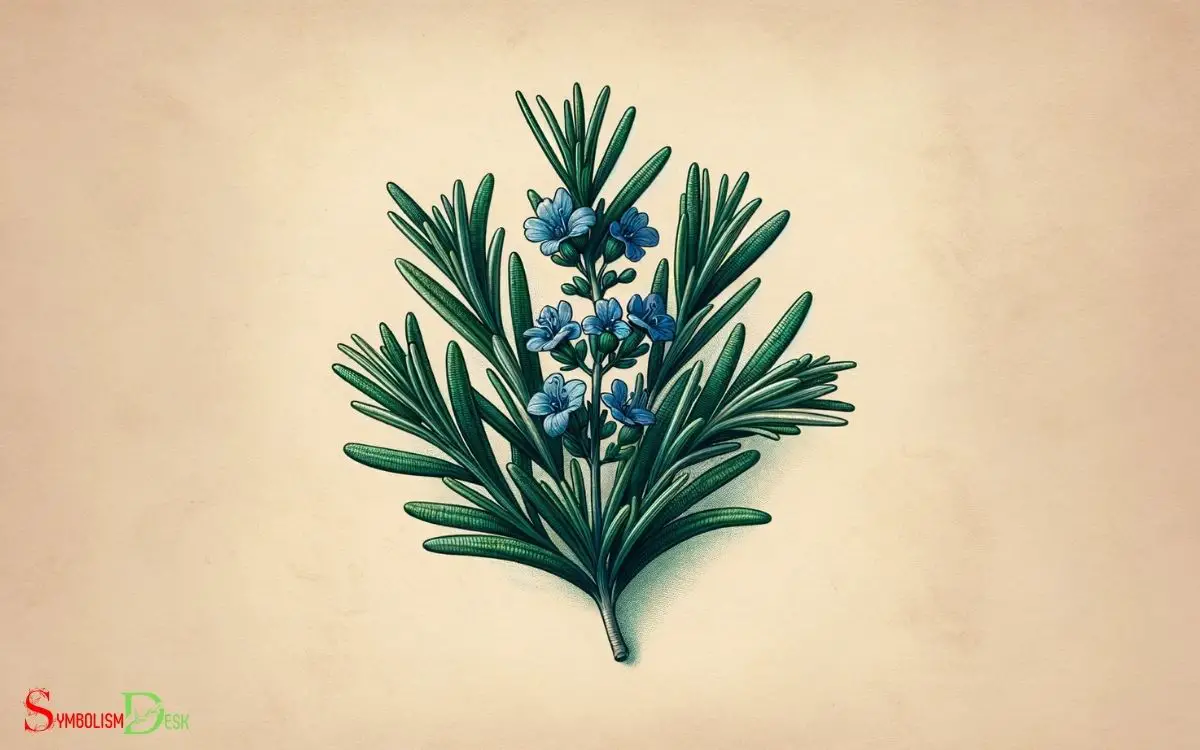What Is the Symbolic Meaning of Rosemary? Love!
Rosemary is an evergreen herb known for its aromatic qualities and is rich in symbolic meaning, often representing remembrance, love, loyalty, and purification. It has been used in various cultural ceremonies and rituals throughout history.
The symbolism of rosemary stems from its use in various traditions:
- Remembrance: In ancient times, rosemary was associated with memory. It was used during weddings and funerals to signify the remembrance of loved ones.
- Love and Loyalty: Often included in wedding bouquets, rosemary signifies love and faithfulness between partners.
- Purification: It has been used in cleansing rituals and to ward off evil spirits.
- Healing: Recognized for its medicinal properties, rosemary was believed to have healing powers.
Rosemary’s presence in literature and folklore further cements its status as a plant with deep symbolic resonance.
Embodying timeless virtues, rosemary transcends mere culinary use to symbolize enduring values in human culture.

Key Takeaway
Historical Symbolism of Rosemary
The historical symbolism of rosemary reflects its association with remembrance and fidelity throughout various cultures.
Rosemary, scientifically known as Rosmarinus officinalis, has been revered for centuries for its aromatic fragrance and medicinal properties.
In ancient Greece and Rome, it was considered a sacred herb, often used in religious ceremonies and as a symbol of loyalty, love, and remembrance.
In the medieval era, it was commonly used in weddings as a sign of fidelity and was often included in bridal bouquets.
Additionally, during the Elizabethan era, rosemary was believed to enhance memory and was frequently used as a symbol of remembrance, especially during funerals.
Its historical significance in various cultures underscores its enduring symbolism of loyalty, remembrance, and fidelity.
Rosemary in Myth and Folklore
Rosemary has played a significant role in ancient rituals, where it was burned as incense to ward off evil spirits and protect against negative energies.
The herb has also been a symbol of remembrance, love, and loyalty, often used in weddings, funerals, and other ceremonies to honor and remember loved ones.
Additionally, rosemary has been deeply rooted in various cultural traditions, with its use in culinary practices, medicinal remedies, and spiritual beliefs across different societies and time periods.
Rosemary in Ancient Rituals
Having a deep history rooted in ancient rituals, incorporating rosemary in myth and folklore has been a significant practice across various cultures.
In ancient Greece, rosemary was associated with Aphrodite, the goddess of love and beauty, and was often used in ceremonies honoring her.
The Romans believed that rosemary was a symbol of remembrance and used it in funeral rites and memorials.
In European folklore, it was believed that hanging rosemary sprigs over the bed could ward off evil spirits and nightmares.
In addition, rosemary was often included in wedding bouquets as a symbol of love and fidelity. Its aromatic properties were also utilized in purification rituals.
The rich tapestry of rosemary’s role in ancient rituals reflects the herb’s enduring significance in human culture.
Rosemary as a Symbol
Symbolism of rosemary in myth and folklore encompasses its varied cultural significance across ancient traditions.
In Greek mythology, rosemary is associated with the goddess Aphrodite and is often used in wedding ceremonies as a symbol of love and fidelity.
The herb also has deep roots in Christianity, where it’s said to have been draped around the Virgin Mary, giving it the name ‘Rose of Mary.’
In ancient folklore, rosemary was believed to ward off evil spirits and was often used in purification rituals.
Its fragrant aroma and evergreen nature have contributed to its symbolism of remembrance and loyalty in cultures worldwide.
The widespread use of rosemary in various myths and folklore reflects its enduring significance as a symbol of love, protection, and remembrance throughout history.
Rosemary in Cultural Traditions
In various cultural traditions, rosemary is revered for its symbolic significance in myth and folklore, with its associations extending across ancient beliefs and practices.
In Greek mythology, rosemary is linked to the goddess Aphrodite and the Virgin Mary, symbolizing love, fidelity, and remembrance.
It was used in ancient Egypt for its purifying properties and in Roman folklore for its association with memory and mourning.
In Shakespearean literature, rosemary is mentioned as a symbol of remembrance.
Additionally, in European folklore, it was believed that planting rosemary near a home would bring good luck and protection.
These cultural traditions highlight the enduring significance of rosemary across different societies and time periods, showcasing its diverse and enduring symbolic meanings in myth and folklore.
Rosemary’s Spiritual Significance
Rosemary holds spiritual significance in various rituals and practices. Its aromatic properties are believed to purify and cleanse spaces, making it a popular choice for smudging and spiritual cleansing ceremonies.
Additionally, rosemary is often used for protection and to ward off negative energy in spiritual practices and traditions.
Rosemary in Rituals
During rituals and ceremonies, many cultures incorporate rosemary for its spiritual significance and symbolic connection to purification and remembrance. Rosemary’s spiritual significance in rituals is rooted in its historical use and botanical properties.
Its role in rituals is as follows:
- Purification: Rosemary is used to cleanse a space or individual of negative energy and to invite in positive influences.
- Remembrance: It symbolizes the remembrance of loved ones and is often included in ceremonies honoring the deceased.
- Protection: It’s believed to provide protection from negative forces and to bring about a sense of security during rituals.
- Connection to the Divine: Rosemary is used to enhance spiritual connections and to invite blessings during sacred ceremonies.
These symbolic associations make rosemary a valuable botanical element in various cultural and spiritual practices.
Rosemary for Protection
Used in various cultural and spiritual practices, rosemary symbolizes protection from negative forces and fosters a sense of security during rituals and ceremonies. This symbolic meaning is deeply rooted in its chemical composition and historical use.
Rosemary contains compounds such as rosmarinic acid and essential oils like cineole, which have been shown to possess antimicrobial and antioxidant properties.
These properties align with the belief that rosemary can purify the energy of a space and protect individuals from harm.
In spiritual practices, rosemary is often burned, carried, or placed in specific areas to create a shield against negativity and promote a harmonious environment.
Its ability to offer protection has made it a staple in rituals aimed at warding off evil spirits and negative energies.
| Protection | Symbolism |
|---|---|
| Cleansing | Purification |
| Shielding | Harmony |
Rosemary in Cultural Traditions
Cultural traditions incorporate rosemary in various ceremonies and rituals, symbolizing remembrance, loyalty, and purification.
This herb holds significant cultural importance in various societies worldwide, often used in the following ways:
- Funerary rites: Rosemary is commonly used in funerals and remembrance ceremonies to symbolize the memory of the departed and the wish for their eternal peace.
- Weddings and celebrations: It’s often included in wedding bouquets, decorations, and rituals as a symbol of fidelity, love, and purification.
- Religious ceremonies: Many cultures use rosemary in religious rituals to cleanse and purify spaces and participants.
- Festive traditions: In some cultures, rosemary is used in traditional festive events as a symbol of good luck, protection, and to ward off negative energies.
Rosemary as a Symbol of Remembrance
Many cultures use rosemary as a symbol of remembrance in various ceremonies and rituals. The association of rosemary with memory and remembrance dates back to ancient times.
In Greek mythology, it’s said that Aphrodite, the goddess of love, was draped with rosemary when she rose from the sea. The herb has since been linked to memory and love.
This symbolism has led to the tradition of using rosemary in funerals, memorial services, and commemorations to honor and remember the departed.
The aromatic scent of rosemary is believed to evoke memories and honor the lives of those who’ve passed away. Its enduring leaves also symbolize the enduring memory of the departed.
Whether used in wreaths, planted at gravesites, or included in memorial bouquets, rosemary serves as a powerful symbol of remembrance across various cultures.
How Does the Symbolic Meaning of a Star Compare to the Symbolic Meaning of Rosemary in Different Cultures or Contexts?
In many cultures, the symbolic meaning of star purity represents guidance, hope, and spiritual illumination. On the other hand, the symbolic meaning of Rosemary is associated with remembrance, love, and protection. While the star symbolizes celestial wisdom, Rosemary embodies earthly virtues and healing properties, offering a unique contrast in cultural symbolism.
Rosemary’s Protective Symbolism
Rosemary’s protective symbolism extends to its traditional use in warding off evil spirits and promoting physical and spiritual well-being, reflecting its significance in various rituals and beliefs.
This protective symbolism is deeply rooted in cultural practices and has been upheld for centuries.
The protective properties of rosemary are attributed to its chemical composition, including compounds such as rosmarinic acid and essential oils.
These compounds possess antimicrobial and antioxidant properties, which are believed to contribute to the protective effects of rosemary.
Additionally, the strong, aromatic scent of rosemary is thought to create a barrier against negative energies.
When used in rituals or placed in living spaces, rosemary is believed to create a shield of protection. Its association with protection has led to its inclusion in various customs and traditions aimed at safeguarding individuals and spaces.
Conclusion
Rosemary holds a rich and diverse symbolic meaning across various cultures and traditions. Like a fragrant tapestry woven throughout history, it has been revered for its spiritual significance, used in remembrance rituals, and valued for its protective symbolism.
Its historical, mythological, and cultural significance has made it a beloved and enduring botanical symbol.






